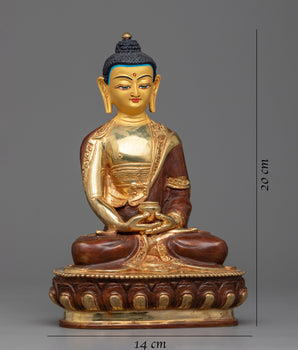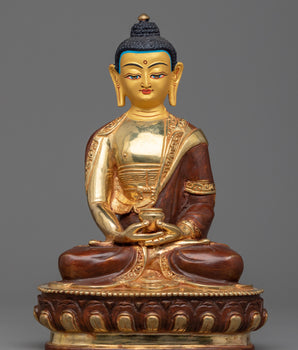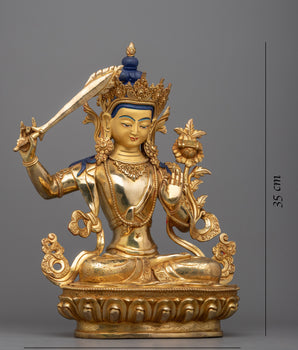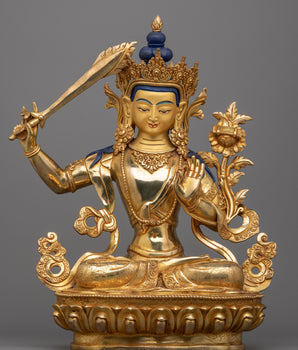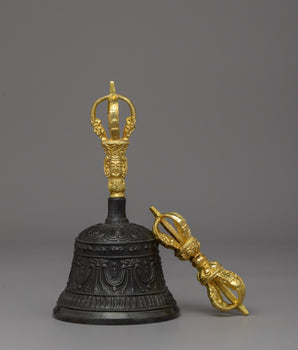What is Buddha Purnima/ Buddha Jayanti?
Buddha Jayanti, also known as Vesak or Buddha Purnima/ Pourmina, is an important day for Buddhists worldwide. This yearly celebration takes place on the full moon day of the Buddhist month of Vesakha, which usually occurs in May or June in the Lunar calendar. The festival commemorates the birth, enlightenment, and death (parinirvana) of Siddhartha Gautama, who later became known as the Buddha.
This event is an auspicious occasion for Buddhists to reflect on the Buddha's life and teachings and reaffirm their devotion to enlightenment. The Buddha Jayanti celebration varies by nation, but it often includes chanting prayers and acts of compassion and kindness. The festival allows Buddhists to unite and celebrate their common faith and values.
The Life of The Buddha
Click here to view High-Quality Buddha Thangka Paintings
The historical Buddha, Siddhartha Gautama, was born at Lumbini, Nepal, in 563 BCE. His father was the Shakya clan's ruler, and his mother was Queen Maya. Before the birth of the Buddha, the queen had a dream in which a white elephant appeared to her, symbolizing the child's majesty, according to Buddhist legend.
Siddhartha enjoyed a life of luxury and pleasure as a young prince. Yet, he walked outside the palace one day and witnessed the misery of everyday people. He was tremendously touched by their suffering and determined to give up his privileged lifestyle to pursue enlightenment.
Siddhartha practiced different types of meditation and asceticism for a number of years. He studied with many teachers as he needed help to obtain his sought answers. Ultimately, he meditated under a Bodhi tree in Bodh Gaya until enlightenment. He comprehended the Four Noble Truths and the Eightfold Path, which became Buddhism's essential teachings.
The Buddha spent the remainder of his life traveling and spreading knowledge after enlightenment. At 80, the Buddha passed away after fully achieving nirvana from suffering. Through Buddhism, his legacy endures, and his teachings inspire and direct people today.
The Teaching of Buddha
The Buddha's primary teachings, the Dharma, focus on the Four Noble Truths and the Eightfold Way.
The Four Noble Truth:
1. The truth of suffering (Dukkha): All life is characterized by suffering, dissatisfaction, and impermanence.
2. The truth of the cause of suffering (Samudaya): The cause of suffering is desire and attachment to the impermanent things of this world.
3. The truth of the cessation of suffering (Nirodha): Suffering can be overcome by letting go of desire and attachment.
4. The truth of the path leading to the cessation of suffering (Magga): The Eightfold Path is the path to liberation from suffering.
The Eightfold Path:
1. Right understanding: Realizing the Four Noble Truths and the nature of reality.
2. Right intention: Developing renunciation, kindness, and harmlessness intentions.
3. Right Speech: Telling the truth while avoiding harmful statements.
4. Right action: Acting morally and avoiding harmful behavior.
5. Right livelihood: Making a living ethically.
6. Right effort: Developing healthy mental states and avoiding unhealthy ones.
7. Right mindfulness: Conscious of one's thoughts, feelings, and surroundings.
8. Right concentration: Acquiring the capacity to concentrate one's thoughts and enter profound stages of meditation.
Many people find inspiration in the life of the Buddha because his transformation from a protected prince to an enlightened human provides hope and direction for those looking for enlightenment and inner peace. His encounters with pain and choice to give up worldly goods, among other significant events leading up to his culture, remind us of the value of compassion and detachment in our lives.
The Buddha's teachings can also aid in our growth in empathy and compassion for others. The Buddha's message of love and understanding can help bridge the gaps that divide us in a society where separation and conflict are too frequent.
Buddha Jayanti Celebration
Buddha Jayanti is a time to meditate on the teachings of Buddha and gain further insight into the path of enlightenment. People come together to commemorate the life and wisdom of Buddha. The celebration of Buddha Jayanti holds immense significance in the Buddhist calendar, providing an occasion for spiritual growth and fellowship among followers of the faith.
Preparations for the event start many weeks prior. Practitioner decorate their homes and monasteries with lights and flowers. They also get ready for the traditional ceremonies and customs that are part of the celebration.
On the day of Buddha Jayanti, practitioners visit temples and monasteries to present their offerings and prayers to Buddha. They recite hymns and listen to speeches that convey Buddha's teachings. Some observe a fast while others consume vegetarian dishes. Additionally, some release birds from captivity, symbolizing empathy and kindness towards all living beings- a crucial lesson espoused by Buddha
Many Buddhists spend the day meditating, reflecting on the life and teachings of the Buddha, and renewing their commitment to the path of enlightenment. Over the world, people celebrate Buddha Jayanti with a lot of zeal and intensity. While regional differences exist in the festivities and customs surrounding this day, they all revolve around honoring the Historical Buddha and his teachings.
Buddha Purnima celebration is marked by various rituals and traditions that vary from region to region. In many countries, it is customary to bathe a statue of the Buddha, symbolizing the purification of the mind and body. While in others, lanterns are released into the sky as a symbol of the release from suffering. Meditation is an essential part of Buddhist practice and crucial during Buddha Jayanti.
Buddha Jayanti In Nepal
The Buddha Jayanti holiday is a national holiday in Nepal, as it is the Buddha's birthplace. Lumbini, where Gautam Buddha was born, holds a special place in the hearts of many. During Buddha Jayanti, people organize various programs and processions, adorning the Maya Devi temple with captivating lights.
One of the events involves placing Lord Buddha's statue on a chariot and parading it through the streets. Musicians and women sing songs while Buddha followers chant prayers and slogans, creating a massive procession that ends at the monastery. Here, a monk delivers a speech on the importance of Buddhism in everyone's lives.
Besides the procession, speeches, and prayers, Lumbini hosts other ceremonies during Buddha Jayanti, such as essay writing and oratory competitions, and awards scholarships to underprivileged students. Additionally, free medical camps are set up throughout the area. As part of the celebrations, the Great Buddha Jayanti Fair attracts followers from all over the world.
"May the teachings of Lord Buddha guide you towards enlightenment and inner peace on this auspicious occasion of Buddha Purnima. Wishing you blessed and and Happy Buddha Purnima!"
Buddha Jayanti in other parts of the world
Buddha Jayanti is a significant festival for Buddhists worldwide, not just those in Nepal. It serves as a reminder of Gautam Buddha's contribution to humanity. In Delhi, the National Museum showcases Buddha's remains to the public.
In Sri Lanka, devotees observe the occasion by adorning their homes and streets with candles and lights. Dansalas, offering free food and drink, are provided to the people. Temples are decorated, and family and friends sing songs.
Myanmar celebrates by watering the Bodhi tree and engaging in music and dance. In Taiwan, Buddha Jayanti is a national anniversary. They offer fragrant water on Buddha's stupas, signifying a fresh start in life.
The celebration of Buddha Jayanti has become a worldwide event in modern times. The Buddha's teachings have impacted individuals from all walks of life and civilizations. The wisdom of the Buddha's teachings is still applicable today as people worldwide continue to struggle with the difficulties of daily living.
There has been an increase in interest in mindfulness and meditation techniques in the West and the East in recent years. These techniques are becoming increasingly popular among individuals to reduce stress, enhance their mental health, and develop a stronger sense of meaning and purpose. More people will turn to these practices to find more peace and pleasure as the Buddha's teachings continue to spread.
Buddha Purnima Significance
Buddha Jayanti is a day of great significance for Buddhists around the world. It is a day to celebrate the Buddha's life, teachings, and legacy. Here are some of the key reasons why this day is so important:
Honoring the Buddha: Buddha Jayanti is a day to honor the Buddha and his contributions to the world. It is a time to reflect on his life and teachings and show gratitude for his accomplishments.
Spreading the Dharma: Buddha Jayanti is also a time to spread the Dharma or the teachings of the Buddha. Buddhists worldwide take this opportunity to share the wisdom and compassion of the Buddha with others.
Promoting Peace: The teachings of the Buddha are centered around compassion, kindness, and nonviolence. On Buddha Jayanti, Buddhists focus on promoting peace and harmony in the world.
Connecting with the Sangha: Buddha Jayanti is a time for Buddhists to connect with one another and the wider Sangha or community of Buddhist practitioners. This sense of community and fellowship is an essential part of Buddhist practice.
Generating Merit: In Buddhism, the practice of developing merit is an important way to create positive karma and cultivate spiritual growth. Many Buddhists use Buddha Jayanti as an opportunity to generate merit through acts of generosity, kindness, and compassion.
Buddha Purnima 2023 (Buddha Jayanti 2023) falls on May 5, 2023.
The importance of Buddha Jayanti now is more significant, may be more than ever. The Buddha's teachings counter our increasingly hurried and materialistic society by highlighting the value of mindfulness, compassion, and introspection. Buddhism's core values of nonviolence, interconnectedness, and environmental stewardship have much to offer in the face of contemporary problems like inequality, conflict, and climate change.
It may also address modern problems like social inequality and climate warming. The central idea of the Buddha's teachings—interdependence—reminds us of the interconnectedness of all things. We may endeavor to build a more equitable and sustainable society by realizing our interconnectedness with the natural world and one another.
To sum it up, Buddha Jayanti serves as a reminder of our collective capacity for reform and progress. The Buddha's life and teachings provide a timeless message of hope and inspiration, serving as a beacon of light in a world that can often appear dark and uncertain. We may respect Buddha's legacy and renew our resolve to live a life of knowledge, compassion, and peace by commemorating Buddha Jayanti. The Eightfold Path and the Four Noble Truths guide how to live a meaningful life and a framework for comprehending suffering and its causes. These lessons, modified for use in many cultural situations, motivate individuals worldwide.





